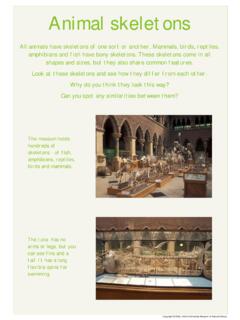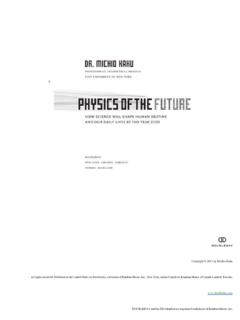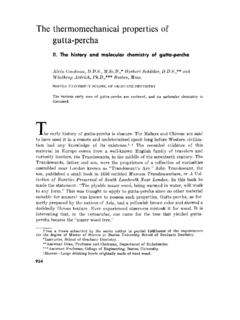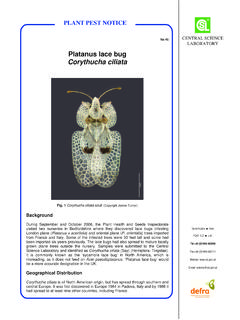Transcription of The Great Debate - Oxford University Museum of …
1 What is Learning more ? Learning more presents a series of articles about the Museum and its collections. It is designed for older students, teachers, researchers, and anyone who wants to find out more about particular aspects of the Museum s work and its history. Learning more articles are free, and available to all for educational, non-profit purposes. Unless otherwise stated, the Museum retains copyright of all material used in this leaflet. Learning Oxford University Museum of Natural History Page 1 The Great DebateThe Great DebateOn 30 June 1860 the Oxford University Museum of Natural History hosted a clash of ideologies that has become known as the Huxley-Wilberforce Debate , or simply the Great Debate .Thomas Henry Huxley (1825-1895), nicknamed Darwin s bulldog , was championing Charles Darwin s revolutionary concept of evolution by natural selection, published less than a year before.
2 Meanwhile, Samuel Soapy Sam Wilberforce (1805-1873), Bishop of Oxford , threw all the force of his theological training into upholding the idea of biblical creation. Both sides claimed victory and the Debate continues to this very day. But what really took place? The true story of what happened turns out to be more complicated than the well-known mythAn account of the Debate written thirty years after it happened has Wilberforce taunting Huxley by asking him whether it was through his grandfather or his grandmother that he claimed descent from a monkey? Huxley supposedly whispered to Sir Benjamin Brodie: The Lord hath delivered him unto my hand before replying, witheringly: If then the question is put to me whether I would rather have a miserable ape for a grandfather or a man highly endowed by nature and possessed of Great means of influence and yet employs these faculties and that influence for the mere purpose of introducing ridicule into a grave scientific discussion, I unhesitatingly affirm my preference for the ape.
3 But eye-witness accounts delivered soon after the event tell a somewhat different protagonistsHuxley was a brilliant young biologist, welcomed into the scientific establishment first through his studies of invertebrate palaeontology and later of apes and humans. As one of Darwin s closest associates he was among the few to know of the ideas in On the Origin of Species ahead of its publication. Reading it for the first time, he declared: How extremely stupid not to have thought of that. Wilberforce was Bishop of Oxford , a position representing the pinnacle of a highly successful career in the Church. Renowned as an eloquent and Thomas HuxleyCharles DarwinSamuel WilberforceLearning Oxford University Museum of Natural History Page 2 The Great Debateinfluential speaker, primarily on clerical topics, Wilberforce also had a first class degree in mathematics and was a Fellow of the Royal the confrontation of the Great Debate took place he had written a review of Darwin s On the Origin of Species, in which he emphasised that his rejection of the theory was solely on scientific grounds , and that he had no sympathy with those whose objections were on the grounds that it contradicted what was taught by Revelation.
4 The scene is setThe occasion for the Debate was the annual meeting of the British Association for the Advancement of Science, an organisation established in 1831 with the far-sighted aim of encouraging public Debate and understanding of scientific matters. Each year it held a public conference in a different city, attended largely by the well-to-do, but without the exclusivity of London s premier scientific academy, the Royal meeting of 1860 marked the public inauguration of Oxford s new cathedral of science , the University Museum , and took place before even the collections had been fully installed or the architectural decorations completed. Darwin s On the Origin of Species by Means of Natural Selectionhad been published only seven months earlier. Darwin himself was absent. Always in uncertain health, he was taking a cure at Dr Lane s Hydropathic Clinic in Petersham, Surrey.
5 Wilberforce was an Honorary Vice President of the meeting: he was already an implacable foe of evolutionary ideas and had been tutored in his arguments by Richard Owen, the Great anatomist and Thursday 28 June Professor Charles Daubeny read a paper On the final causes of the sexuality in plants, with particular reference to Mr Darwin s . Owen countered with the exaggerated claim that the brain of a gorilla was more different from that of a human than from that of the lowest primate. Huxley, known for using the similarity of ape and human brains as evidence of evolution, considered this a blatant challenge by Owen. He stood and contradicted Owen flatly, but politely. By Friday evening, exhausted by all the argument, Huxley intended to go home. But another evolutionist, Robert Chambers, begged him to stay s meetingOn the Saturday morning the Great and good of British science assembled - together with a crowd of Oxford students, clerics and local ladies and gentlemen - in the library reading room on the first floor of the Museum .
6 The Rev. John Stevens Henslow, Darwin s Cambridge botany professor and lifelong friend, took the chair. The main billing for Saturday s session was Dr John W. Draper of New York University , who read a long and boring paper titled On the Intellectual Thomas Huxley Cathedral of science Learning Oxford University Museum of Natural History Page 3 The Great DebateDevelopment of Europe, considered with reference to the views of Mr. Darwin and others, that the progression of organisms is determined by law . After he had finished, Henslow called on others to respond and there was some noisy reception from the students. After this, Henslow allowed the floor only to those with arguments and not for mere declamation .Wilberforce then accepted an invitation to speak. He employed the same arguments that were set out in his anonymous review of The Origin, which was to appear in The Quarterly Reviewthe following month.
7 His rhetoric - now strictly logical, now witheringly dismissive, always flamboyant - carried the audience along; the majority was with him in any case. Ladies in the window waved their white handkerchiefs, students in the rear cheered and jeered, while the clerics smugly applauded. At the end of this all-out attack, Wilberforce added the one rhetorical flourish that has gone down in history. But what was it?Insults tradedThree days after the Debate took place, John Richard Green wrote about it to Sir William Boyd Dawkins. His letter records: Up rose Wilberforce and proceeded to act as the Smasher. The white chokers [clergymen] who were present cheered lustily [..] as Samuel rattled on: He had been told that Professor Huxley had said that he didn t see that it mattered much to a man whether his grandfather were an ape or no! Let the learned Professor speak for himself and the like.
8 July s issue of a popular journal, The Athenaeum, stated: The Bishop of Oxford came out strongly against a theory which holds it possible that man may be descended from an ape. But others conspicuous among these, Prof. Huxley have expressed their willingness to accept, for themselves, as well as for their friends and enemies, all actual truths [..] Both accounts imply that the ape-grandfather metaphor had originally been coined by Huxley rather than Wilberforce. Wilberforce sat down to tumultuous applause and Huxley rose to reply. By his own account, in a letter to his friend Henry Dyster sent more than two months later, Huxley told the audience that he had listened with Great attention to the Lord Bishop s speech but had been unable to discover either a new fact or a new argument in it except indeed the question raised as to my personal predilections in the matter of ancestry [.]
9 ] That it would not have occurred to me to bring forward such a topic as that for discussion myself, but that I was quite ready to meet the Right Revd. Prelate even on that ground. If then, said I, the question is put to me would I rather have a miserable and so on. Green s account concurs: Huxley young, cool, quiet, sarcastic, scientific in fact and in treatment [..] gave his Lordship such a smashing: I asserted, and I repeat, that a man has no reason to be ashamed of having an ape for a grandfather. If there were an ancestor whom I should feel shame in recalling, it would rather be a man, a man of Samuel Wilberforce Learning Oxford University Museum of Natural History Page 4 The Great Debaterestless and versatile intellect, who, not content with [..] success in his own sphere of activity, plunges into scientific questions with which he had no real acquaintance, only to obscure them by an aimless rhetoric, and distract the attention of his hearers from the real point at issue by eloquent digressions and skilled appeals to religious prejudice.
10 Hooker s contributionDarwin s friend the botanist Joseph Hooker did not think the exchange worth mentioning when he wrote to tell Darwin what had passed. Well, Sam Oxon got up and spouted for half an hour with inimitable spirit, ugliness and emptiness and unfairness [..] Huxley answered admirably and turned the tables, but he could not throw his voice over so large an assembly nor command the audience [..] The battle waxed hot. Lady Brewster fainted, the excitement increased as others spoke; my blood After hearing three more speakers, Hooker was sufficiently incensed to stand up himself. I swore to myself that I would smite that Amalekite, Sam, hip and thigh [..] and I handed my name up to the President as ready to throw down the gauntlet.. [T]hen I smashed him amid rounds of applause. [..] I proceeded to demonstrate: (1) that he could never had read your book, and (2) that he was absolutely ignorant of the rudiments of Bot.







